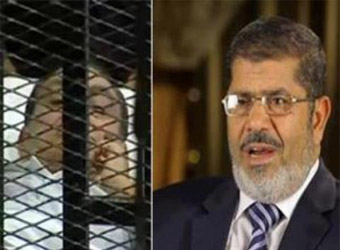Egyptians have a lot to be upset about these days, and they are showing it. The one-year anniversary of Egyptian President Mohamed Morsi’s inauguration has brought with it major protests and counter protests, raising fears of renewed political violence. Underneath all the anger lies a basic fact: The Egyptian economy is in deep trouble.
Since former President Hosni Mubarak was ousted in 2011, the state’s revenue has decreased sharply. The business sector is in the doldrums, and investments have dried up as both domestic and foreign investors bide their time waiting for the political fog to lift. At the same time, the government’s expenditures are mounting. The climb is partly a result of salary increases that were granted to government workers since the uprising in an attempt to quell the unrest. More fundamentally, though, the costs of subsidies on food prices and, above all, energy continue to mount as oil prices increase on the world market but Egyptian consumers are charged the same prices as before. Energy subsidies now amount to more than $16 billion a year, with an additional $4 billion devoted to food.
A country in such dire straits would usually turn to the International Monetary Fund (IMF) for support, accepting painful and even politically dangerous reforms to secure a much-needed loan. But after two years of negotiations, which started with the first post-Mubarak transitional government under the Supreme Council of the Armed Forces (SCAF), Egypt has yet to reach an agreement with the IMF. Talks are now on the back burner until after Egypt’s parliamentary elections, which will take place sometime this fall or in 2014. In the meantime, the country’s foreign currency reserves have dwindled from $36 billion before the uprising to $16 billion in May 2013, having reached a low of $13.4 billion in March. Also in May, the country’s Standard & Poor long-term credit rating was downgraded from B- to CCC+, and the budget deficit reached over 11 percent of GDP, up from 8.3 percent before the uprising.
Many factors explain the failure of negotiations between Egypt and the IMF. National pride, for one, has certainly played a role. In June 2011, after the two sides reached a draft deal for a 12-month $3 billion loan that required Egypt to enact some demanding economic reforms, the SCAF-led government pulled back. The leadership announced that Egypt did not need a loan after all and would pursue its own homegrown reforms instead of those imposed by the IMF. In this case, Egyptian national pride trumped economic need.
Fear of the consequences of reform has also been a deterrent, particularly because no government since 2011 has enjoyed much legitimacy. Many Egyptians saw successive governments formed under the SCAF as tainted by the military and, in any case, provisional. And even though the election that brought Morsi to power was fair, his legitimacy (and that of his entire government) is contested nearly every day by the opposition. No wonder, then, that no government has had much desire to enact tough reforms. Even Mubarak, who had much more confidence in his government’s staying power, never dared to reform the country’s unsustainable and indiscriminate food and energy subsidies.
Whatever successive Egyptian governments’ precise reasons for refusing to sign an IMF agreement, their behavior was made possible only by generous support from countries in the region, mostly oil- and gas-rich states in the Gulf.
For its part, Qatar provided Egypt with $5 billion after Morsi was elected in June 2012. Some of that came as direct deposits in the central bank, the rest as low-interest loans. The small emirate pledged an additional $3 billion in April 2013, which was released in the form of a low-interest loan the following month. Saudi Arabia announced a $4 billion aid package in mid-2011 and, by December 2012, had paid out about $1.75 billion of that, much of it as direct deposits. The rest will supposedly be doled out as loans for development projects and financing for small and medium enterprises.
Turkey, meanwhile, announced a $2 billion loan in September 2012. By the end of 2012, half of that amount had been deposited in the Egyptian Central Bank, with the rest earmarked for financing development projects. The United Arab Emirates also pledged $3 billion in aid to Egypt as early as 2011, but by June 2013 no part of that had been delivered. UAE officials have promised that the pledge will be honored but that it will take time to do it “the right way.” Finally, even war-torn but oil-rich Libya has opened its pockets. In April 2013, it announced and promptly delivered an interest-free $2 billion loan.
Source: Foreign Affairs
